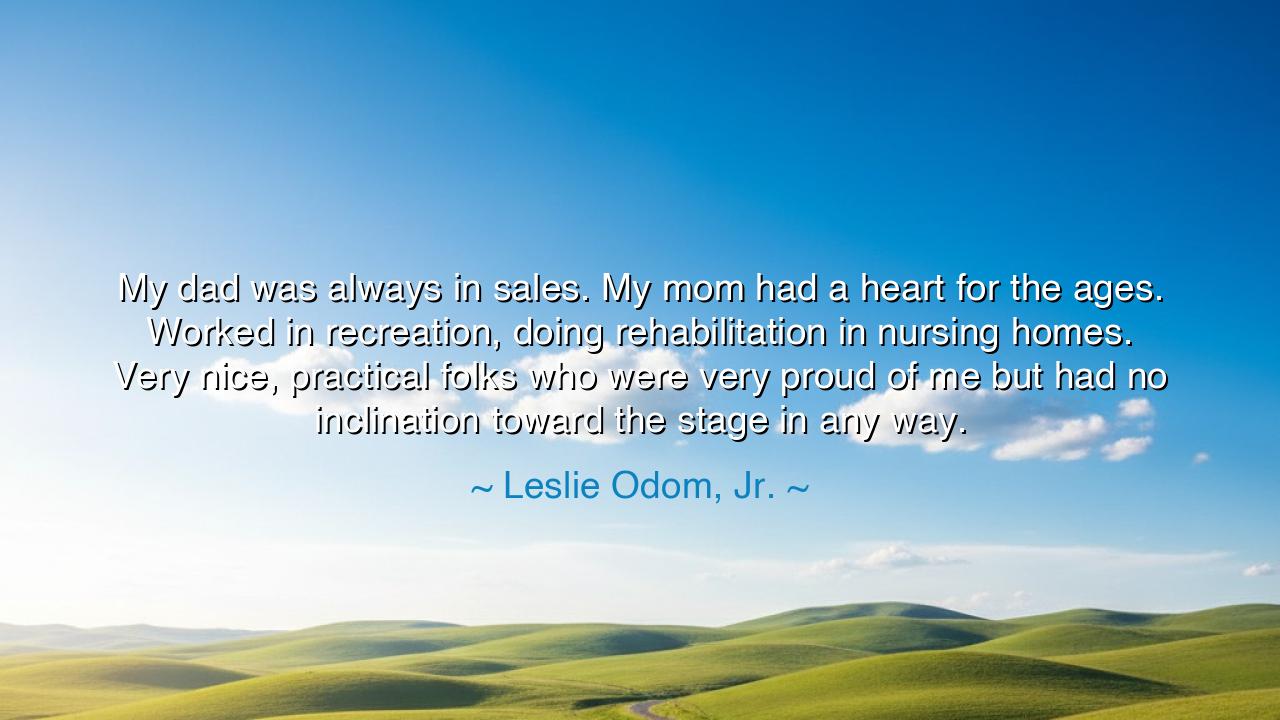
My dad was always in sales. My mom had a heart for the ages.
My dad was always in sales. My mom had a heart for the ages. Worked in recreation, doing rehabilitation in nursing homes. Very nice, practical folks who were very proud of me but had no inclination toward the stage in any way.






"My dad was always in sales. My mom had a heart for the ages. Worked in recreation, doing rehabilitation in nursing homes. Very nice, practical folks who were very proud of me but had no inclination toward the stage in any way." — Leslie Odom, Jr.
In this tender remembrance, Leslie Odom, Jr., the celebrated actor and singer known for his stirring portrayal of Aaron Burr in Hamilton, speaks of the roots from which his greatness grew. His words, though spoken with humility, carry the deep resonance of gratitude and reflection. When he describes his parents as “very nice, practical folks,” he is not diminishing them, but elevating them. He honors the quiet strength of ordinary people—the unsung pillars upon which every extraordinary life is built. His father, a man of sales, and his mother, a woman with “a heart for the ages,” represent the eternal archetype of the working family: steady hands, humble hearts, and boundless faith in the next generation.
The origin of this quote lies in Odom’s reflections on his journey from Philadelphia to Broadway and beyond. Unlike many performers born into families of art and music, Odom’s roots were not theatrical—they were practical. His parents did not teach him to act, sing, or perform; they taught him something rarer: the value of integrity, compassion, and work. His father, a man who lived by persuasion and persistence, embodied the discipline of everyday labor—the art of showing up, of speaking well, of believing in what one sells. His mother, laboring in rehabilitation, embodied empathy—the art of healing, of seeing the fragile humanity in others. Though they never stood upon a stage, they lived as artists of the soul, crafting lives of quiet dignity.
There is a profound beauty in Odom’s words: the recognition that greatness can rise from simplicity. His parents may not have known the stage, but they understood the deeper art of life—of love, of service, of endurance. It is a truth as old as time: that the seeds of destiny are often planted in ordinary soil. From blacksmiths were born warriors; from farmers, poets; from humble families, kings and scholars. So too did Leslie Odom, Jr., emerge not from privilege, but from character—from a lineage of honest labor and unwavering devotion. His art, then, is not a rebellion against his origins, but a fulfillment of them—the flowering of the virtues his parents sowed in him.
History is full of such stories. Abraham Lincoln, son of a poor farmer and a mother who could barely read, rose to lead a divided nation. Ray Charles, born to parents who worked the fields, learned to find beauty in the simplest chords. And Leslie Odom, Jr., though nurtured by parents unfamiliar with the stage, carried their lessons into the spotlight. His father’s salesmanship taught him the art of persuasion—the same art that gives his performances their conviction. His mother’s compassion became the soul behind his voice, the warmth that makes his art human. From their modest lives, he inherited the materials to build a monument of grace.
In truth, the quote reveals a timeless moral: that nobility is not confined to the grand or glamorous. The world may celebrate the actor, the artist, the leader—but behind each stands the laborer, the caregiver, the parent who toiled in obscurity. These are the invisible architects of greatness. The “very nice, practical folks” who may never seek applause, yet whose love shapes destinies. Odom’s gratitude reminds us that no achievement exists in isolation; every triumph is built upon the sacrifices of others. His story is not one of personal glory, but of inheritance—the quiet inheritance of virtue passed from one generation to the next.
And so, my child of the future, learn from this tale. Do not despise humble beginnings, nor believe that greatness requires grand origins. If your parents are workers, teachers, or caretakers, know that their labor is your legacy, their discipline your inheritance. Honor them not by imitation, but by transformation—take their values and shape them into something new. Whether your path leads to the stage or the field, the office or the unknown, carry their spirit within you.
For as Leslie Odom, Jr. teaches us through his remembrance, the measure of a family is not its fame, but its faith—the faith that love, hard work, and kindness can raise a child into someone who changes the world. So live with gratitude. Let every triumph be a tribute to those who came before you, and let your success become the song that tells their story. For when you honor the ordinary with reverence, you uncover the divine truth: that even the simplest lives can give rise to greatness, and that every act of love—no matter how small—echoes through eternity.






AAdministratorAdministrator
Welcome, honored guests. Please leave a comment, we will respond soon